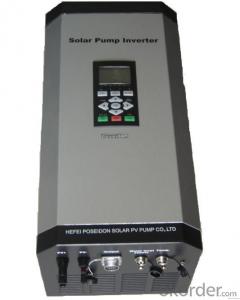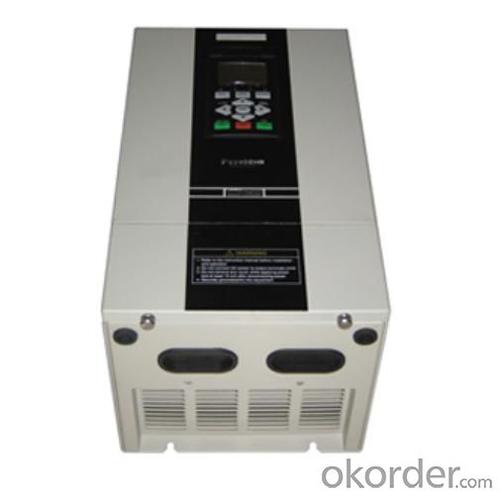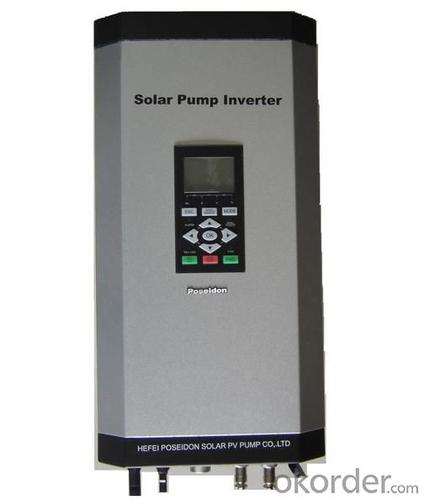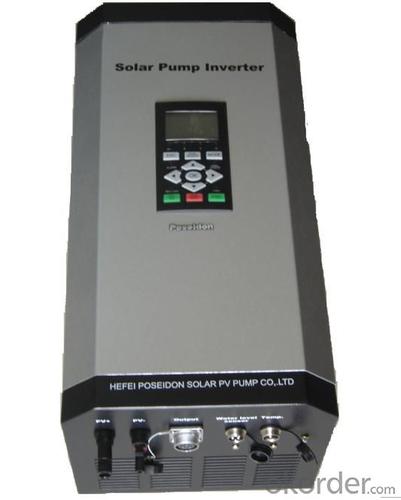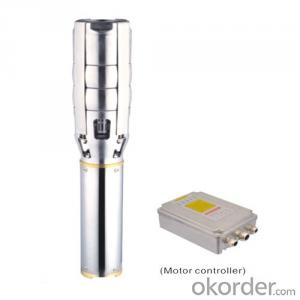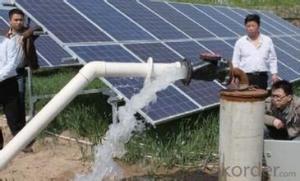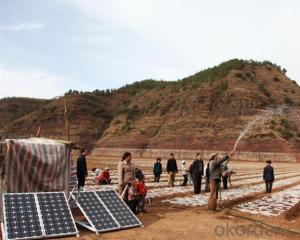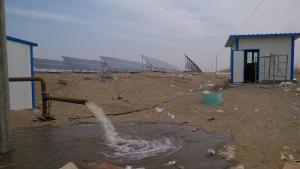Solar Pump Inverter FCPM22KH - Solar Pump Supplier
- Loading Port:
- China Main Port
- Payment Terms:
- TT OR LC
- Min Order Qty:
- -
- Supply Capability:
- -
OKorder Service Pledge
Quality Product, Order Online Tracking, Timely Delivery
OKorder Financial Service
Credit Rating, Credit Services, Credit Purchasing
You Might Also Like
Solar pump inverter FCPM22KH Product Description:
Solar water pumping system is constructed with solar panel array,solar pump inverter and AC water pump, DC current produced from solar panel will be delivered to solar pump inverter,and it will convert it into AC current to drive water pump,and will automatically regulate output frequency according to sun radiance intensity,maximally realize MPPT tracking function.
Features
Adopting the proposed dynamic VI maximum power point tracking (MPPT) control method, with fast response, and reliable operation, achieves efficiency of 99%.
Designed with variable frequency driver, greatly improves efficiency
Extremely high efficiency
Digital mode control, with automatic operation and manual operation mode options
Complete protection functions
Adopts intelligent IPM module, with high reliability
LCD display and operation panel, in real time presents operating data
Optional for water level measurement and control circuit
Applicable for general ACC pumps, like centrifugal pump, piston pump etc.
Independent intellectual property; Highly effective, the redundant reliability, exempts the maintenance and the long life.
The pumps are soft started, fully protected.
No batteries are used. So better Sunlight, more water.
Datasheet.
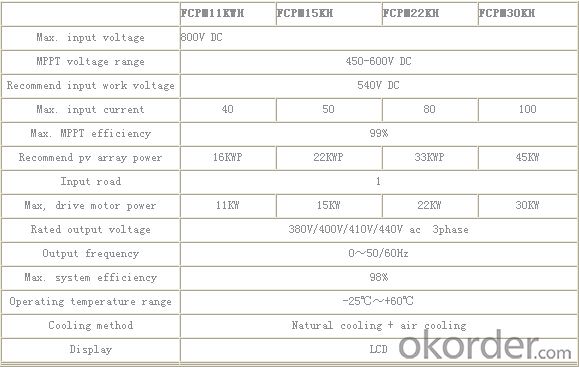
- Q: Can a solar pump be used for filling a pond or lake?
- Yes, a solar pump can be used for filling a pond or lake. Solar pumps utilize energy from the sun to power their operation, making them a sustainable and environmentally-friendly option for water pumping. They can effectively draw water from a source and transfer it to a pond or lake, providing a reliable solution for filling water bodies without relying on traditional electricity sources.
- Q: How does a solar pump handle water source contamination from natural disasters?
- A solar pump does not directly handle water source contamination caused by natural disasters. However, it can play a crucial role in providing access to clean and safe water in situations where traditional water supply systems may be compromised or damaged. Solar pumps can be used to extract water from deep wells, rivers, or lakes and then the water can be treated or filtered to remove any contaminants before consumption or use. Additionally, solar pumps can be easily deployed and operated in disaster-stricken areas, as they do not rely on an electrical grid and can continue functioning even in the absence of power.
- Q: Can a solar pump be used for fire protection?
- Yes, a solar pump can be used for fire protection. Solar pumps are capable of providing a sustainable and reliable water supply, which is essential for firefighting purposes. They can efficiently draw water from various sources such as wells, lakes, or rivers, providing a constant flow of water to extinguish fires. Additionally, solar pumps are environmentally friendly and cost-effective, making them an ideal choice for fire protection in areas without access to traditional power sources.
- Q: How reliable are solar pumps?
- Solar pumps have proven to be highly reliable in various applications. The reliability of solar pumps depends on several factors such as the quality of the equipment, proper installation, and regular maintenance. High-quality solar pumps manufactured by reputable companies are designed to be durable and withstand harsh weather conditions. They are often made from corrosion-resistant materials and are built to last for many years. Additionally, these pumps are equipped with advanced technologies such as MPPT (Maximum Power Point Tracking) controllers, which maximize the efficiency and performance of the system. Proper installation is crucial for the reliability of solar pumps. It is important to ensure that the pump is correctly sized and installed in an optimal location with adequate sunlight exposure. Additionally, proper wiring and connections are essential to prevent any electrical issues that may affect the pump's performance. Regular maintenance is also necessary to ensure the long-term reliability of solar pumps. This includes cleaning the solar panels to maximize their efficiency, checking the pump's performance, and inspecting the system for any potential issues. By conducting regular maintenance, any problems can be identified and addressed promptly, minimizing downtime and maximizing the reliability of the pump. Overall, solar pumps have proven to be a reliable and sustainable solution for various water pumping needs. When installed and maintained properly, they can provide a consistent and efficient water supply, even in remote locations where access to grid electricity is limited.
- Q: How does the size of the solar pump controller affect its performance?
- The size of the solar pump controller does not directly affect its performance. The performance of the solar pump controller depends on its technical specifications, efficiency, and compatibility with the solar pump system. However, it is important to ensure that the controller is appropriately sized to match the power requirements and capacity of the solar pump system for optimal performance.
- Q: How does a solar pump help in reducing the risk of crop failure?
- A solar pump helps in reducing the risk of crop failure by providing a reliable and sustainable source of water for irrigation. By harnessing solar energy, the pump can operate even in remote areas without access to electricity. This ensures that crops receive adequate water, leading to improved growth and productivity. Additionally, solar pumps eliminate the need for costly fuel or electricity, making them more affordable for farmers and reducing their dependency on external resources. Overall, the consistent water supply from a solar pump helps mitigate the risk of crop failure caused by drought or inadequate irrigation.
- Q: Can a solar pump be used in areas with high water tables?
- Yes, a solar pump can be used in areas with high water tables. Solar pumps are designed to function in various water sources, including areas with high water tables. They are capable of effectively extracting water from shallow depths, making them suitable for such locations.
- Q: How does a solar pump compare to a diesel-powered pump?
- Solar pumps and diesel-powered pumps differ significantly in terms of their advantages and disadvantages. When it comes to cost, a solar pump necessitates the installation of solar panels and batteries, resulting in a higher initial expense. Conversely, a diesel-powered pump has a lower upfront cost but incurs ongoing fuel and maintenance costs. In the long run, a solar pump can prove more cost-effective due to its reliance on renewable energy sources and absence of continuous fuel purchases. In regard to environmental impact, a solar pump is highly eco-friendly as it utilizes clean solar energy and emits no pollutants. It contributes to the reduction of carbon footprint, air pollution, and dependence on fossil fuels. In contrast, a diesel-powered pump emits harmful greenhouse gases and pollutants, thus exacerbating air pollution and global warming. When it comes to reliability, a solar pump may be less dependable in areas with inconsistent sunlight or during cloudy days. However, technological advancements have enhanced solar pumps, making them more efficient and capable of storing excess energy for use during low-light periods. On the other hand, a diesel-powered pump is highly reliable as long as there is a continuous fuel supply. Maintenance and operational costs also differ between the two pump types. Solar pumps generally require less maintenance due to their fewer moving parts compared to diesel-powered pumps. However, if repairs or replacements are needed, solar components can be more expensive due to their specialized nature. Diesel-powered pumps require regular maintenance, such as oil changes and filter replacements, along with ongoing fuel costs. Lastly, solar pumps are particularly suitable for remote areas or places lacking access to electricity grids, as they operate independently using solar energy. In contrast, diesel-powered pumps necessitate a constant fuel supply, which can be challenging or costly in remote locations. Ultimately, the selection between a solar pump and a diesel-powered pump hinges on factors such as upfront costs, environmental considerations, reliability, maintenance requirements, and the availability of electricity or fuel. Each option possesses its own advantages and limitations, and the decision should be based on the specific needs and constraints of the situation.
- Q: Can a solar pump be used for water supply in agricultural greenhouses?
- Yes, a solar pump can be used for water supply in agricultural greenhouses. Solar pumps are increasingly being used in greenhouse farming as they are cost-effective, environmentally friendly, and can provide a reliable source of water for irrigation. By harnessing solar energy, these pumps can efficiently draw water from wells, rivers, or other sources and distribute it to the crops within the greenhouse, ensuring optimal growth and productivity.
- Q: How does a solar pump help in reducing the risk of electrical accidents?
- A solar pump reduces the risk of electrical accidents by eliminating the need for grid electricity, thereby eliminating the potential hazards associated with handling electrical wires and equipment.
Send your message to us
Solar Pump Inverter FCPM22KH - Solar Pump Supplier
- Loading Port:
- China Main Port
- Payment Terms:
- TT OR LC
- Min Order Qty:
- -
- Supply Capability:
- -
OKorder Service Pledge
Quality Product, Order Online Tracking, Timely Delivery
OKorder Financial Service
Credit Rating, Credit Services, Credit Purchasing
Similar products
Hot products
Hot Searches
Related keywords


